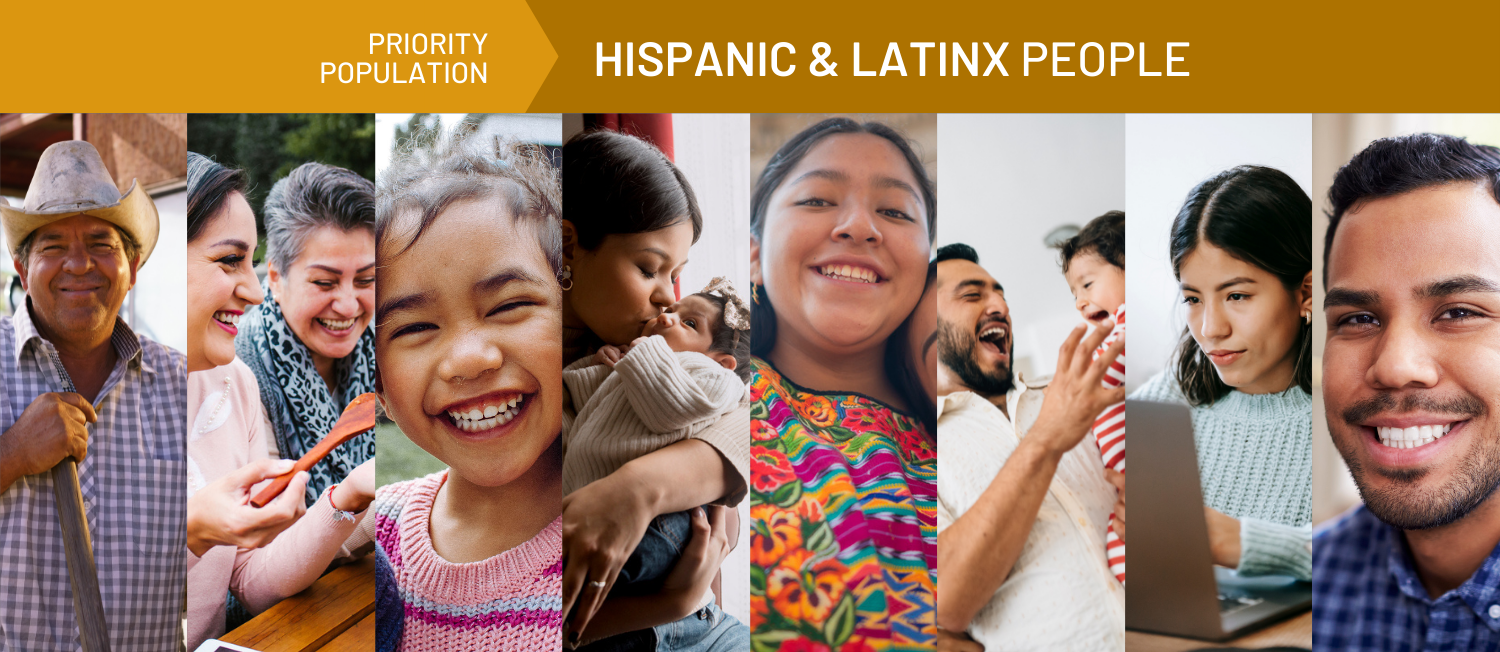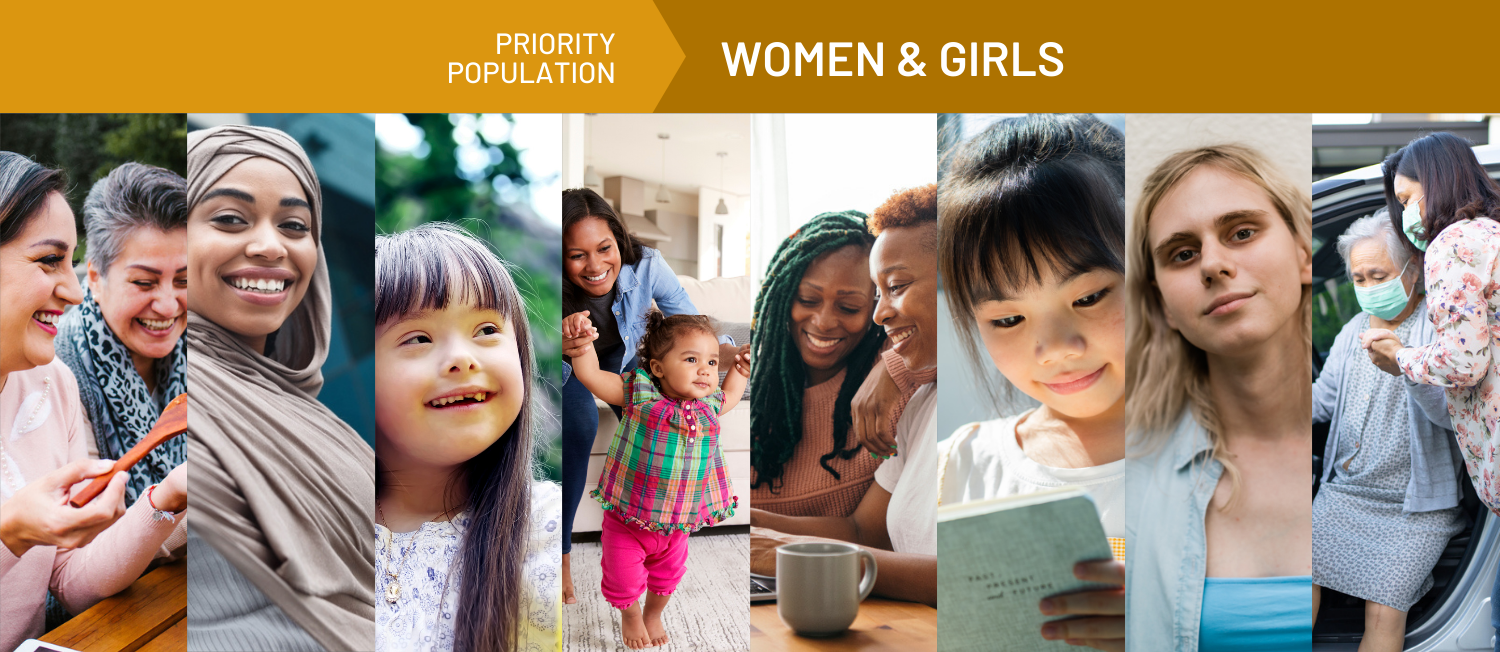Reproductive Justice
Community Commons is committed to acknowledging and sharing the Black history behind the reproductive justice movement, including naming and crediting the 12 founders: Toni M. Bond Leonard, Reverend Alma Crawford, Evelyn S. Field, Terri James, Bisola Marignay, Cassandra McConnell, Cynthia Newbille, Lorretta Ross, Elizabeth Terry, ‘Able’ Mable Thomas, Winnette P. Willis, and Kim Youngblood.
All people deserve full autonomy over their sexuality, gender, work, and reproduction. Reproductive justice—a framework created by activist Women of Color—addresses reproductive health through the lenses of race, gender, class, ability, nationality, orientation, socioeconomic status, legal status, and environment. Reproductive justice goes beyond reproductive rights by focusing on access to care, social contexts of health, and intersectional well-being outcomes. It includes the rights to maintain personal bodily autonomy, have children, not have children, and parent children in safe, accessible, healthy, sustainable communities. Reproductive justice is achieved when marginalized people—especially women, girls, and people who are LGBTQ+, disabled, low-income, undocumented, and/or of color—are able to freely and equitably exercise these rights.
The term “reproductive justice” was coined in 1994 by Women of African Descent for Reproductive Justice for the purpose of combining reproductive rights with social justice, and lifting up the marginalized individuals, families, and communities excluded by the early reproductive rights movement. This included—and still includes today—acknowledging and addressing the United States’ long legacies of reproductive abuses, beginning with abuses of Black, Indigenous, and People of Color. BIPOC communities have been systemically robbed of their bodily and reproductive autonomy through histories of slavery, rape, displacement and land theft, as well as theft of children by social services and boarding schools. The U.S. has conducted and supported the forced and coerced sterilizations of Black, Indigenous, Latinx, LGBTQ+, disabled, migrant, and incarcerated people. This includes historic mass sterilizations of African Americans in the mid-1900s, up to 25% of Native American women during the 1970’s, up to 33% of Puerto Rican women in the 1960’s, and over 70,000 disabled people since 1927. At the same time, other populations—such as white women—have experienced the opposite: providers’ reluctance or refusal to provide birth control. LGBTQ+ and disabled people have been subject to eugenicist practices of erasure, legal barriers to bodily autonomy and raising children, and systemic exclusion from basic sexual and reproductive healthcare.
These legacies of systemic abuse have given rise to extreme health disparities, as well as rampant mistrust in U.S. healthcare and social services systems. As we approach the historic 50-year anniversary of Roe v. Wade (January 22, 2023), basic reproductive rights—access to contraception, birth control, pregnancy termination, and transgender healthcare—are still deeply entrenched in politicized debate. Across the U.S., Black maternal and infant health continues to be a significant area of concern (Black women are three times more likely to die from pregnancy-related causes than white women). The nonconsensual sterilization of disabled people is still legal today in most states, while many people seeking hysterectomies are still denied due to ageist and sexist beliefs about preserving fertility. Transgender and nonbinary people are still required to show proof of surgery (often involving sterilization) in many states. Intersex people are still forced to endure non-consensual, forced gender reassignement surgery, often as children or infants. The United States’ entire economy still relies heavily on the free labor of women and LGBTQ+ people to raise children, maintain homes, and support family life. The reproductive justice movement offers a critical framework to explain the interrelation of inequities and chart a path towards individuals’ full bodily autonomy, healthy families, and thriving communities.
Achieving reproductive justice requires deep acknowledgement, evaluation, and disassembling of the oppressive systems perpetuating exploitation and abuse. Across the U.S., activists can push for all peoples’ rights to full autonomy over their bodies, sexuality, gender, work, and reproduction, including the decision to have children or not have children, and parent children in safe, sustainable communities. Changemakers and communities can work to address legacies of injustice, improve access to basic reproductive healthcare for all people, eliminate disparities in maternal and infant care, ban coerced sterilization, support informed choices about consensual sterilization, improve family planning and social services, and end violence and abuse. Organizations and individuals can take a first step by centering those who have been historically marginalized and excluded from reproductive rights and health.
Resources & Tools
Reframing Neurocognitive Differences: What the Neurodiversity Movement Means for Public Health and Equity
Story
-
 Original
Original
Brought to you by Community Commons
Teen Pregnancy in New Mexico
Story
-
 Original
Original
Brought to you by Community Commons
Published on 03/01/2017
Bearing the Burden: How racism-related stress hurts America’s black mothers and babies
Story
-
 Original
Original
Brought to you by Community Commons
Published on 10/02/2018
Premature Birth Rates Rise Again, But A Few States Are Turning Things Around
Story
Brought to you by NPR
How the US Polarized on Abortion — Even As Most Americans Stayed in the Middle
Story - Written
Brought to you by Vox
Taking Action for Reproductive Justice: Our Favorite Tools, Resources, and Data
Story
-
 Original
Original
Brought to you by Community Commons
Counting All in Our Communities: Sexual Orientation and Gender Identity Data
Story
-
 Original
Original
Brought to you by Community Commons
I Want to Be Like Nature Made Me: Medically Unnecessary Surgeries on Intersex Children in the US
Story - Written
Brought to you by Human Rights Watch
The Black History of Public Health: From Legacies of Racism and Resistance to Futures of Equity and Justice
Story
-
 Original
Original
Brought to you by Community Commons
Women Bearing Hardships During Pandemic: COVID-19 Disrupts Care, Mental Health, Economic Security
Story - Written
Brought to you by APHA
Supporting Mothers and Families: A Global Conversation on Pregnancy, Birth, and Early Childhood
Resource - Blog
Brought to you by U.S. General Services Administration
Reasons for Rejecting Hormonal Contraception in Western Countries: A Systematic Review
Resource - Journal Article
Brought to you by Elsevier, Inc.
Effects of Substance Use Disorder Criminalization on American Indian Pregnant Individuals
Resource - Journal Article
Brought to you by AMA
Inequity in US Abortion Rights and Access: The End of Roe is Deepening Existing Divides
Resource - Policy Brief
School-based Strategies to Support Adolescent Sexual and Reproductive Health
Resource - Website/webpage
“My Body, Whose Choice?” A Call to Advance Reproductive Justice in Pediatric Training
Resource - Journal Article
Brought to you by American Academy of Pediatrics
Forced Sterilization of Disabled People in the United States
Resource - Report
Brought to you by National Women's Law Center
Improving Adolescent Sexual and Reproductive Health: A Systematic Review of Potential Interventions
Resource - Journal Article
Cultivating Vital Conditions For Perinatal Well-Being And A Sustained Commitment To Reproductive Justice
Resource - Journal Article
Brought to you by Health Affairs
How Should a Physician Respond to Discovering Her Patient Has Been Forcibly Sterilized?
Resource - Case Study
Brought to you by AMA
Financial Instability and Delays in Access to Sexual and Reproductive Health Care Due to COVID-19
Resource - Journal Article
Brought to you by Mary Ann Liebert, Inc.
Maternal and Child Health Digital Library
Resource - Data Bank/repository
Brought to you by HHS Health Resources and Services Administration
Reduced Disparities in Birth Rates Among Teens Aged 15-19 Years - United States, 2006-2007 and 2013-2014
Resource - Report
Brought to you by CDC
Reproductive Justice: Voices Not Just Choices
Resource - Blog
Brought to you by University of Alabama at Birmingham
Racial and Ethnic Disparities in Assisted Reproductive Technology Outcomes in the United States
Resource - Journal Article
Brought to you by Elsevier, Inc.
Building Partnerships to Support and Expand Youth Access to Reproductive Health Care
Resource - Website/webpage
The History of Tiered-Effectiveness Contraceptive Counseling and the Importance of Patient-Centered Family Planning Care
Resource - Journal Article
Brought to you by Elsevier, Inc.
Disability Rights and Heritable Genome Editing: Resources for Teaching and Learning
Resource - Data Bank/repository
How Can the Experiences of Black Women Living With HIV Inform Equitable and Respectful Reproductive Health Care Delivery?
Resource - Journal Article
Brought to you by AMA
Interpersonal Violence in the Lives of Urban American Indian and Alaska Native Women: Implications for Health, Mental Health, and Help-Seeking
Resource - Journal Article
Brought to you by APHA
Decriminalizing Abortion: How Our Movements Can Organize in Solidarity With Each Other
Resource - Policy Brief
Brought to you by HIP
Racial/Ethnic Disparities in Pregnancy-Related Deaths — United States, 2007–2016
Resource - Report
Brought to you by CDC
Data & Metrics
Related Topics











.png)


























































































